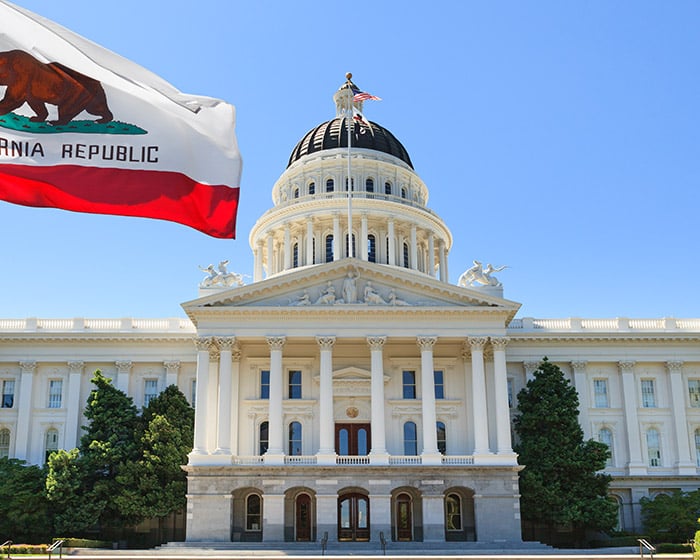Key Takeaways
- Starting January 1, 2026, companies with more than $500 million in revenue doing business in California will be required to report climate-related financial risks every two years.
- The California Air Resources Board (CARB) will accept good faith efforts in the first year of reporting, offering flexibility for companies that have not produced a climate report in the past.
- Reports must be submitted via CARB’s online portal by January 1, 2026.
Starting January 1, 2026, more than 4,000 companies must file climate risk disclosures under California’s SB 261. For many, this will be the first time producing a climate report, butYear 1 allows flexibility, and good faith efforts are acceptable, even if your data and processes are still evolving.
Here’s what SB 261 requires and how to prepare with confidence.
What is SB 261?
SB 261 is California’s Climate Risk Reporting Rule. It requires companies with more than $500 million in revenue doing business in California to report climate-related financial risks every two years.
Reports must align with the Taskforce on Climate-related Financial Disclosures (TCFD) or International Sustainability Standards Board (ISSB) IFRS S2 frameworks and be submitted to the California Air Resources Board (CARB) via a public URL by January 1, 2026.
What Does “Good Faith” Look Like for Year 1?
CARB has made it clear that they do not expect perfection in the first year of reporting. Companies can:
- Choose which fiscal year’s data to use (2023/24 or 2024/25)
- Focus on a few material areas — not all 11 TCFD topics
- Explain any omissions and outline plans to fill gaps
Companies will have the flexibility to decide which fiscal year’s climate risk data will be used in their first report. The CARB has signaled a preference for using FY 2024/25 climate risk data, but 2023/24 data is in compliance as long as it is complete and ready by the January 1, 2026, deadline. For businesses without existing climate risk reporting, the priority should be to begin collecting FY 2024/25 data in alignment with TCFD guidelines as soon as possible
For Year 1, organizations are not required to cover all 11 TCFD topics substantively. According to the ISSB’s 2024 progress report, the average company provides substantive disclosures on just 4.1 areas — primarily board oversight, GHG emissions, and climate risks and opportunities. More complex topics, like scenario analysis, are only reported by about 8 percent of companies.
CARB has also indicated that the GHG metrics aspect (Scope 1, 2, and 3 reporting) and scenario analysis will not be required as part of SB 261.
For Year 1, you can choose to report on a few material areas as long as you can justify excluding certain topics and how gaps can be filled in future reports.
Disclosure Expectation Across Sectors:
Disclosure depth depends on your industry. Here’s what good faith typically looks like:
- Energy, Insurance, Manufacturing: 6+ elements reported
- Pharma, Retail, Tech: 3-5 elements
- Consumer Goods, some Financials: 3 or fewer elements
- MYR Group (Engineering): Identifies climate risks and opportunities, shares Scope 1 and 2 emissions, and outlines governance and risk management.
- Whirlpool (Manufacturing): Uses scenario analysis, sets net-zero goals, and reports board-level governance, but lacks a full climate strategy.
- Adams Street Partners (Finance): Integrates climate risk into investment decisions, reports Scope 1–3 emissions, and sets net-zero targets.
- Merck (Pharma): Embeds climate risk into enterprise risk management, reports across all scopes, and uses a Low Carbon Transition Playbook.
What an SB 261-Compliant TCFD Report Looks Like
Here are four examples of companies across sectors and sizes that California Climate Rules will likely impact. Having their existing disclosure reports aligned to TCFD or ISSB means they are already in compliance.
5 Steps to Prepare for SB 261 Compliance Now:
1. Assess: Identify your material climate risks
Examine your operations at a high level to identify where climate change poses the most significant risks and where opportunities may emerge. For many companies, this includes physical risks (e.g., extreme weather) and transition risks (e.g., changing regulations or customer expectations). Assess your risks against the four TCFD pillars: Governance, Strategy, Risk Management, and Metrics & Targets.
2. Collect: Pull existing governance and risk data
Gather what you already have: board or management oversight documents, emissions data and targets, enterprise risk registers, or sustainability initiatives. You don’t need perfect data in Year 1, but you will have to explain any gaps.
3. Gap Check: Note data gaps and plan improvements
Compare your current information against TCFD or ISSB S2 requirements. Identify any missing material pieces, prepare to explain any gaps, and create a plan to fill them.
4. Draft: Build a short, TCFD-aligned narrative
Pull everything together into a clear, concise report. Focus on what’s material: governance, targets, and the most significant risks and opportunities. Explain any gaps and outline how you’ll fill them over time.
Eide Bailly has experience tailoring reports for regulatory filings and public audiences, making sure your disclosure is both compliant and stakeholder-ready.
5. Submit: File by January 1, 2026, and refine for 2028
Upload your report via URL to the CARB portal by January 1, 2026. The public portal will be open between December 2025 and July 2026. Use the two-year cycle to strengthen your reporting, improve data quality, and expand coverage by 2028, when penalties will be enforced.
Prepare Today for Compliance Tomorrow
SB 261 marks a major milestone in U.S. climate disclosure. While expectations will increase over time, companies can meet the first deadline by focusing on the basics, being transparent about limitations, and building a roadmap for more complete reporting.
With less than three months to prepare for compliance, now’s the time to act. Eide Bailly is here to guide you through every step, from assessment to submission.
Become empowered to navigate the future of climate-related reporting.
 Talk to our specialists
Talk to our specialistsSustainability & ESG
Who We Are
Eide Bailly is a CPA firm bringing practical expertise in tax, audit, and advisory to help you perform, protect, and prosper with confidence.


